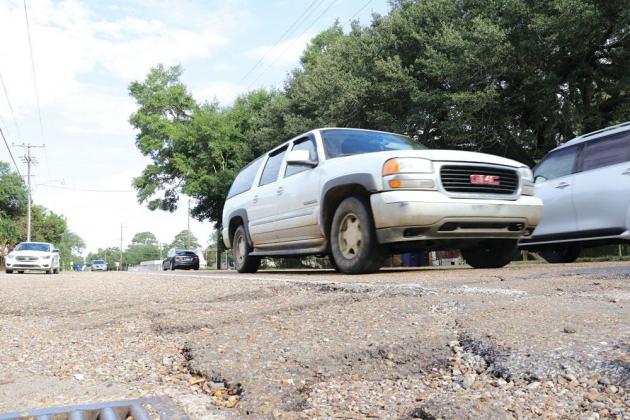
A $1.8 million Maple Avenue paving project escaped a veto by Gov. John Bel Edwards as happened in previous years.
Edwards signed the 2019 Capital Outlay Bill — Act 20 — on Monday, providing nearly $1.5 billion in new funding for construction and infrastructure improvements throughout the state.
The La. 91 paving project has been a focus for State Rep. Phillip DeVillier, R-Eunice, since being elected nearly four years ago.
The District 41 representative said a start date for construction is two years away and he is investigating how to expedite the process since the money is available.
DeVillier said the project would be from La 13 to the bridge at Bobcat Drive.
The funding came from a $300 million surplus. The money was divided into six areas with the governor getting $40 million and legislators getting $40 million for infrastructure projects, he said. DeVillier used that as the funding source for the Maple Avenue project.
Despite that appearing a safe funding source, the project could have been vetoed, he said.
Eunice Mayor Scott Fontenot said he lobbied the governor’s office for the project.
In October 2018, Fontenot and DeVillier met with Dr. Shawn Wilson, secretary of the state Department of Transportation and Development, and Bill Oliver, district DOTD administrator.
Wilson, while in front of Champagne’s grocery, said,“So, in talking to leaders here, Maple is a critical footprint for them.”
DeVillier said Wilson signed onto the project.
Two major projects at LSU Eunice fell under the budget pen.
One of the projects at LSUE would have provided $13,555,000 for renovations at the Science Building. The other was a $500,000 repair project at the Acadian Center Kitchen.
DeVillier said the LSUE projects could still come through the Board of Regents in deferred maintenance. If that doesn’t occur, the projects can go through the process again.
“What I would love to do is build a new one,” DeVillier said of the science building.
Left in the spending, but as Priority 2 items, at LSUE are roof replacement at the science building, $564,000; and heating and air conditioner repairs at the science building, $501,600.
Dr. Nancee Sorenson, who just arrived at LSUE as chancellor, released a statement about the capital outlay outcome.
“We are pleased that the $500,000 for the upgrade to the Science Building’s HVAC system and the $500,000 for a new roof on the building might be moving forward to the Bond Commission for a vote. We are disappointed that the Governor Edwards vetoed the funds needed for the renovation of the Science Building, our campus’ oldest building, and the those required to repair the kitchen in our student union’s cafeteria. We appreciate the efforts our many supporters throughout Louisiana made to advance these projects. These are important to students, our economy, and the community.“
Also avoiding a veto is a $300,000 sewer improvement project in Church Point. The project is a Priority One project.
Also in Acadia Parish, the governor vetoed $520,000 for planning and construction of infrastructure improvements at the Acadia Parish Public Works Complex.
“That public works project has been on the capital outlay list for a while, about five years,” said Acadia Parish Police Jury Secretary-Treasurer A.J. “Fatty” Broussard. “It was a planned consolidation of the public works bard across the parish. But we’re not going to pursue that any further because we’ve already improved the individual barns so we’re not going to consolidate.”
Broussard said the parish will look to “roll that over” into another project if possible.
In a letter to Speaker of the House Taylor F. Barras and Senate President John Alario Jr., Edwards explained his reasoning for the line item vetoes.
“The capital outlay budget I submitted to the legislature recommended $679 million in Priority I general obligation bond appropriations and an additional $128 million in Priority 2, allowing for $30 million in remaining general obligation bond capacity for Fiscal Year 2019-2020,” he wrote.
“However, as finally passed by the legislature, House Bill 2 contains $767 million in Priority I general obligation bond appropriations and an additional $305 million in Priority 2, totaling more than $235 million above the general obligation capacity for Fiscal Year 2019-2020.”
Additionally, Edwards pointed out that the bill adopted by the legislature also contains $1.3 billion in Priority 5 (waiting list) appropriations, a 30 percent increase above the budget he submitted.
“Not only does the capital outlay budget ... contain appropriations that are not possible for the upcoming year, it also increases possible spending in out years by more than 30 percent,” Edwards wrote. “Further, this will create significant challenges in this year and in following years to generate the capacity necessary to fund the infrastructure projects needed in this state.”
Some highlights of the new funding for infrastructure in HB 2 include:
— More than $300 million for the Department of Transportation and Development;
— Nearly $30 million for airport infrastructure improvements;
— $94 million for construction of roads and bridges;
— Nearly $40 million for water infrastructure projects;
— $31 million in sewer and wastewater improvements;
— $246 million for education construction projects; and
— $53 million for the Coastal Protection and Restoration Authority.
